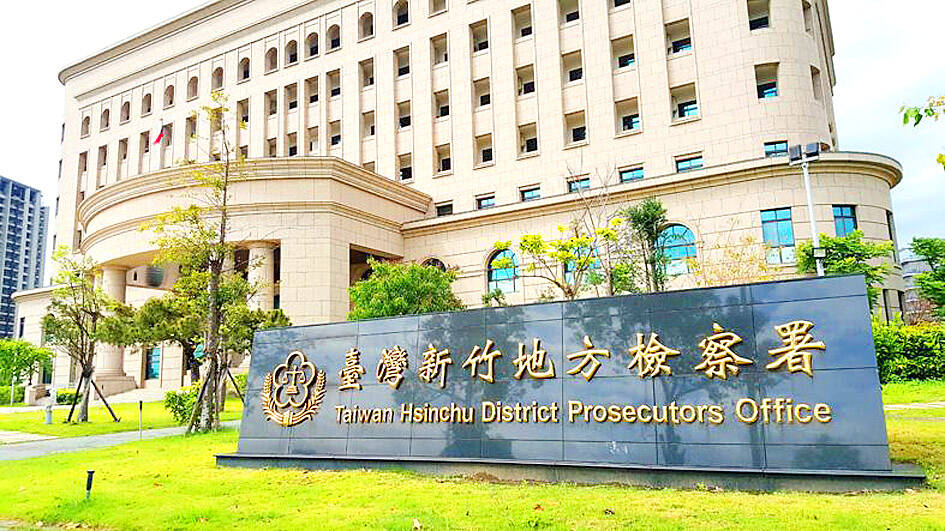An investigation revealed eight Chinese chip companies allegedly illegally poaching talent and trade secrets in Taiwan, the Hsinchu District Prosecutors’ Office said yesterday, underscoring a heated global rivalry to develop key technology used in cellphones, vehicles and artificial intelligence.
In a joint investigation launched last month by the Hsinchu, Taipei and New Taipei City prosecutors’ offices, 135 officers under the direction of the Ministry of Justice Investigation Bureau raided 30 locations and questioned 65 people from Aug. 19 to Friday last week, the Hsinchu District Prosecutors’ Office said in a statement.
The Chinese companies allegedly hid their backgrounds and recruited talent from Hsinchu Science Park (新竹科學園區), in an effort to acquire high-end technologies such as semiconductors, it said.

Photo: Tsai Chang-sheng, Taipei Times
The companies were iCommsemi (中國深圳市南方硅谷半導體), Shanghai New Vision Microelectronics Co (上海新相微電子), NJAVC (南京齊芯半導體), Emotibot Technologies Ltd (中國竹間智能科技上海), Tongfang Co (同方), ACTT (成都銳成芯微科技), Naura Technology Group Co (中國北方華創微電子裝備) and Hestia Power Inc (中國上海瀚薪科技), prosecutors said.
Naura, which supplies China’s biggest chipmaker, Semiconductor Manufacturing International Corp (中芯), allegedly illegally recruited engineers who worked on chip-related equipment, they said.
The Beijing-based company said in a statement to Bloomberg News that its office in Taiwan “was set up in accordance with local laws and regulations and there is no poaching.”
Hestia Power allegedly moved capital to Taiwan by setting up shell companies in third countries with funding from a sub-fund of the of the Chinese Ministry of Finance’s China Integrated Circuit Industry Investment Fund and the Small and Medium Enterprise Development Fund, prosecutors said.
Tongfang — owned by China National Nuclear Corp (中國核工業集團), a Chinese state-run enterprise that oversees military nuclear programs, information technology, and energy and environmental projects — allegedly disguised its source of funding by setting up a Taiwanese company that recruited a research team of nearly 100 people, in an attempt to acquire technology, they said.
ACTT, a supplier of IC patents and product design, allegedly attempted to cover up its illegal business in Taiwan by telling its staff to register their health insurance at trade unions or district offices, they said.

Taiwanese can file complaints with the Tourism Administration to report travel agencies if their activities caused termination of a person’s citizenship, Mainland Affairs Council Minister Chiu Chui-cheng (邱垂正) said yesterday, after a podcaster highlighted a case in which a person’s citizenship was canceled for receiving a single-use Chinese passport to enter Russia. The council is aware of incidents in which people who signed up through Chinese travel agencies for tours of Russia were told they could obtain Russian visas and fast-track border clearance, Chiu told reporters on the sidelines of an event in Taipei. However, the travel agencies actually applied

Japanese footwear brand Onitsuka Tiger today issued a public apology and said it has suspended an employee amid allegations that the staff member discriminated against a Vietnamese customer at its Taipei 101 store. Posting on the social media platform Threads yesterday, a user said that an employee at the store said that “those shoes are very expensive” when her friend, who is a migrant worker from Vietnam, asked for assistance. The employee then ignored her until she asked again, to which she replied: "We don't have a size 37." The post had amassed nearly 26,000 likes and 916 comments as of this

New measures aimed at making Taiwan more attractive to foreign professionals came into effect this month, the National Development Council said yesterday. Among the changes, international students at Taiwanese universities would be able to work in Taiwan without a work permit in the two years after they graduate, explainer materials provided by the council said. In addition, foreign nationals who graduated from one of the world’s top 200 universities within the past five years can also apply for a two-year open work permit. Previously, those graduates would have needed to apply for a work permit using point-based criteria or have a Taiwanese company

The Shilin District Prosecutors’ Office yesterday indicted two Taiwanese and issued a wanted notice for Pete Liu (劉作虎), founder of Shenzhen-based smartphone manufacturer OnePlus Technology Co (萬普拉斯科技), for allegedly contravening the Act Governing Relations Between the People of the Taiwan Area and the Mainland Area (臺灣地區與大陸地區人民關係條例) by poaching 70 engineers in Taiwan. Liu allegedly traveled to Taiwan at the end of 2014 and met with a Taiwanese man surnamed Lin (林) to discuss establishing a mobile software research and development (R&D) team in Taiwan, prosecutors said. Without approval from the government, Lin, following Liu’s instructions, recruited more than 70 software